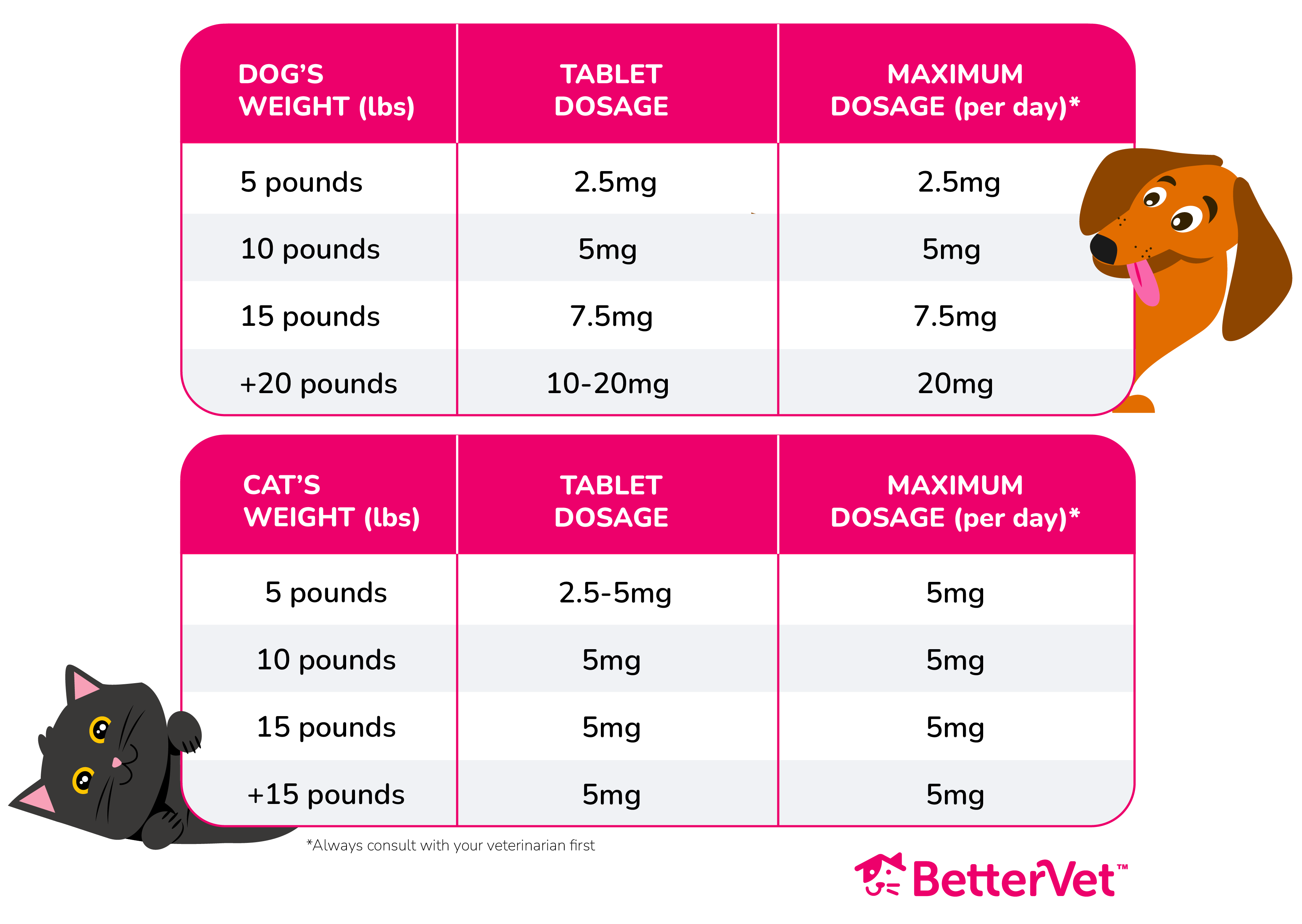Zyrtec for Pets: Is Cetirizine Safe and Effective for Pet Allergies?

Table of Contents
Zyrtec for Treating Allergy Symptoms in Pets
How Often Should You Give Your Pet Zyrtec?
Zyrtec for Dogs
- Recommended Cetirizine Dosage in Dogs
Zyrtec for Cats
- Recommended Cetirizine Dosage in Cats
Zyrtec Warnings for Pets
Cetirizine Side Effects in Pets
Precautions When Giving Your Dog or Cat Zyrtec
Medications That Should Not Be Combined With Zyrtec
Many pets struggle with allergies, experiencing constant scratching and discomfort that make them restless and unhappy. As a veterinarian, I've seen firsthand how allergies can impact a pet’s quality of life.
The good news is they may find relief with Cetirizine, brand name Zyrtec, a commonly used antihistamine with humans that can also be used to treat dogs and cats.
In this post, I'll explore how you can provide relief to your pet's allergies with Zyrtec, what side effects to watch out for, and how to ensure their safety and comfort.
Dr. Montgomery's Key Takeaway
Zyrtec is effective for skin allergies, insect bites, and atopic dermatitis. It’s important to be cautious when giving Zyrtec to pets and should only be administered under the guidance of a veterinarian.
Read on for information, dosage, and considerations about giving Cetirizine to pets.
How Does Zyrtec Help With Pet Allergies?
Zyrtec (cetirizine) is an over-the-counter medicine that blocks histamine, reducing allergy symptoms like itching and inflammation in pets. It's used mainly for dogs with environmental allergies.
📒 Note: Always consult a veterinarian before use to ensure safety and appropriate dosage for your pet's specific health conditions.
Types of Zyrtec (Cetirizine)
Zyrtec is available in various forms: single-ingredient tablets, combination-ingredient tablets, chewable tablets, capsules, oral liquid, and disintegrating tablets.
Zyrtec for Treating Allergy Symptoms in Pets
Since cetirizine is meant to block histamine, Zyrtec works well for various allergy symptoms in pets like:
-
Scratching
-
Hives
-
Insect bites
-
Seasonal allergies – pollen, grass, weeds
Does Your Pet Have Skin Allergies?
1. How frequently does your pet seem itchy?
2. Where does your pet scratch the most?
3. Which season is your pet’s symptoms the most noticeable?
4. How often does your pet seem uncomfortable?
5. Can you see any of the following symptoms on your pet’s skin?
6. Is your pet experiencing any of the following symptoms?
View Results
How Often Should You Give Your Pet Zyrtec?
The frequency of administering Zyrtec (cetirizine) to pets, particularly dogs, typically ranges from once to twice daily, depending on the severity of the allergic symptoms and your vet's advice.
It's crucial to follow a veterinarian's specific recommendations on dosage and frequency to ensure it's safe and effective for your pet's particular needs.
Dosages can vary based on the pet's weight and health condition, so a vet's guidance is essential.

Zyrtec for Dogs
Under the guidance of a veterinarian, cetirizine can treat itching, scratching, hives, sneezing, and insect bites in dogs. It can be effective for canine seasonal allergies caused by pollen, grass, and weeds and as a treatment for atopic dermatitis
Recommended Cetirizine Dosage in Dogs
The recommended dosage is 0.5 mg per pound of your dog’s weight, up to 20 mg, given every 12-24 hours.
Zyrtec for Cats
Cetirizine can be recommended by your veterinarian for temporary relief from the symptoms of feline seasonal allergies, such as itchy skin and a runny nose or eyes.
Recommended Cetirizine Dosage in Cats
The recommended dosage of cetirizine for cats is a total dose of 2.5 - 5 mg per cat one to two times daily.
Zyrtec Warnings for Pets
Zyrtec-D®, which contains pseudoephedrine, is not safe for use in dogs or cats. Another consideration is the inactive ingredients that may be in combination with Zyrtec as these can be toxic to pets.
Watch out for liquid formulations that contain propylene glycol, which is toxic to cats, and disintegrating tablets that contain xylitol, which is toxic to dogs.
Cetirizine Side Effects in Pets
Based on my observation as a veterinarian, Cetirizine can be a good antihistamine choice because it causes fewer drowsiness side effects compared to Benadryl and hydroxyzine.
Side effects are uncommon, but some dogs and cats may experience:
-
Loss of appetite
-
Nausea
-
Vomiting
-
Constipation
-
Diarrhea
-
Dilated pupils
-
Urinary retention
Less Common Reactions to Zyrtec in Pets
The symptoms below are not as common, but Zyrtec could still cause:
-
Sedation
-
Drowsiness
-
Agitation or restlessness at high doses
-
Rare reactions include hypersensitivity reactions, pruritus, and dry eye
Precautions When Giving Your Dog or Cat Zyrtec
There are certain conditions that would prevent your veterinarian from recommending Cetirizine for your pet. These include:
-
Pets with hypersensitivity to antihistamines
-
Dogs and cats with liver disease
-
Pet patients with seizure disorders
-
Dogs or cats with increased ocular pressure (glaucoma), hyperthyroidism, urinary retention, intestinal atony, cardiovascular disease, & hypertension
-
Working animals (possible sedating effects, although less likely)
-
Nursing & pregnant pets
Medications That Should Not Be Combined With Zyrtec
The list of medications below should not be administered to your pet with Cetirizine:
-
Cetirizine products with combined pseudoephedrine (Zyrtec-D)
-
Central nervous system depressants such as diazepam (Valium) or alprazolam (Xanax) & tranquilizers
-
Medications for urinary incontinence
-
Antispasmodics
-
Other antihistamines
-
Selegiline or other MAOIs
Discuss with your veterinarian if your pet is on supplements or vitamins to ensure safety
Summing Up Zyrtec for Pets
Zyrtec, when administered correctly, can offer effective relief for your pet's allergy symptoms. Cetirizine is a good antihistamine option with few side effects. Keep an eye out for any reactions, and always talk to your veterinarian first.
If your pet is excessively scratching or showing other ongoing signs of allergies, schedule a virtual veterinary visit or in-home Allergy and Dermatology exam with BetterVet today.
Does Your Pet Have Itchy Paws or Flaky Skin?
Our veterinarians can bring relief. Schedule a visit for allergy testing in the comfort of your home.
Frequently Asked Questions
Yes, Zyrtec can be a good choice for allergy relief pets. It effectively blocks histamine, preventing allergy symptoms. Plus, it typically causes less drowsiness than Benadryl.
Both Claritin and Zyrtec are effective at reducing allergy symptoms in pets. However, some pets may respond better to one medication than the other. Always consult with your veterinarian first. Additionally, it's important to note that certain forms of Claritin may contain decongestants, which are toxic to pets.
Zyrtec requires less frequent dosing than Benadryl, and it causes less drowsiness compared to Benadryl.
Sources
-
Griffin JS, Scott DW, Miller WH Jr, Tranchina MM. An open clinical trial on the efficacy of cetirizine hydrochloride in the management of allergic pruritus in cats. Can Vet J. 2012 Jan;53(1):47-50. PMID: 22753962; PMCID: PMC3239147.
-
Hsiao YH, Chen C, Willemse T. Effects of cetirizine in dogs with chronic atopic dermatitis: a randomized, double blind, placebo-controlled trial. J Vet Sci. 2016 Dec 30;17(4):549-553. doi: 10.4142/jvs.2016.17.4.549. PMID: 27297415; PMCID: PMC5204033.






